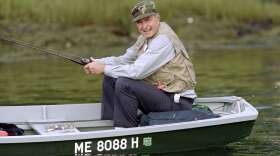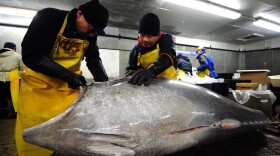Fred Bever
A Columbia University graduate, Fred began his journalism career as a print reporter in Vermont, then came to Maine Public in 2001 as its political reporter, as well as serving as a host for a variety of Maine Public Radio and Maine Public Television programs. Fred later went on to become news director for New England Public Radio in Western Massachusetts and worked as a freelancer for National Public Radio and a number of regional public radio stations, including WBUR in Boston and NHPR in New Hampshire.
Fred formerly was Maine Public Radio’s chief political correspondent from 2001 to 2007 and returned to Maine Public Radio in early 2016 as a news reporter and producer, covering a wide variety of topics across Maine and the region.
-
Many of the workers in Maine's lobster processing industry are people of color, but lobstermen are almost all white. A new program is aiming to diversify the state's lobster fleet.
-
A federal investigation of allegations that China is illegally avoiding duties on solar panels sold to U.S. companies is putting the brakes on the nation's solar power build-out.
-
New research finds the Gulf of Maine hit record hot temperatures in 2021. It's warming three times faster than the world's oceans, and is already seeing major disruption to its ocean ecosystems.
-
Maine's Atlantic puffins took a big hit this year. Chicks' survival rate plummeted after a record-setting "marine heatwave" disrupted food supplies.
-
Maine's Atlantic puffins took a big hit. Chicks' survival rate plummeted after a record-setting "marine heatwave" disrupted food supplies, showing how climate change is driving vast ecosystem change.
-
Maine's economy relies heavily on summer tourism. With Memorial Day around the corner, many business owners are figuring out when and whether they'll be allowed to reopen.
-
No matter where in the globe former President Bush's pursuits took him, he circled back every year, as if tethered, to Walker's Point — his family's estate in Kennebunkport, Maine.
-
Scientists says to help whales, the ropes used to tend lobster traps must be changed or eliminated. Mainers who catch lobster for a living feel they're being singled out for an international problem.
-
After decades with no sign of a lethal neurotoxin, the algae that produces it is now plaguing the warming waters of the Gulf of Maine, forcing unprecedented closures in shellfish harvesting.
-
New England fishers say it's been decades since they've hauled in so many tuna, and some in the industry are urging higher quotas. But some environmental groups fear the population is still imperiled.








